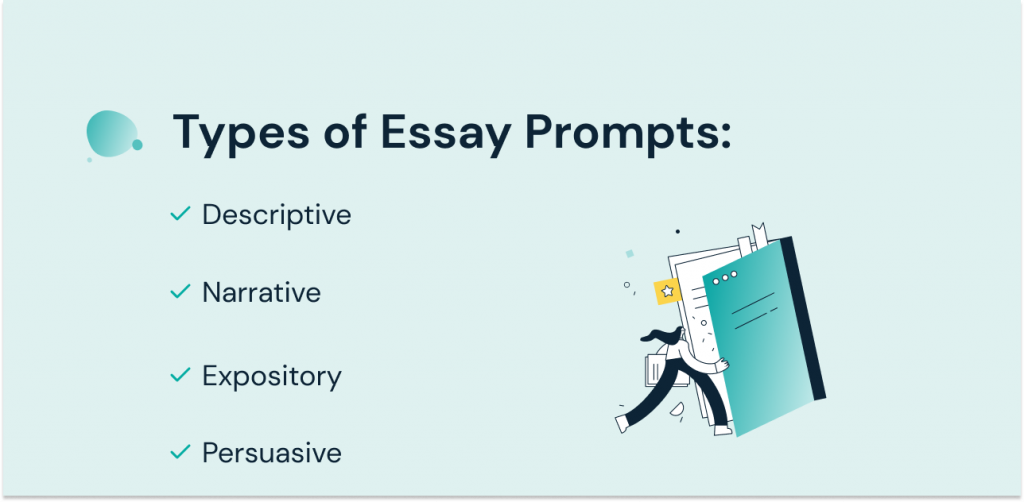By high school or even as early as middle school, students have dealt with general writing topics – and likely a good number of them. That said, many students will be less familiar with essay prompts. While a general writing topic is going to be based on a broad subject area that a writer explores through an essay, an essay prompt is a more specific kind of writing topic. Are you among those who need to write an essay based on an essay prompt really soon but aren’t sure how to get started?
This article will explain how to write essays based on essay prompts, be they essays for college or for high school. So, without further ado, let’s dive right into the fearsome topic of the dreaded “prompts essay.”
Further in the Article: |
Types of Essay Prompts: The Basics
What are essay writing prompts? To reiterate, they are short writing instructions that offer writing topics that are more specific. Because they are more specific, some consider them to be more complex. Educators might assign any number of issue topics for essays, be it pertaining to anthropology, astronomy, political science, or virtually any other field of human endeavor. Essay prompt topics are more elaborate than general essays topics. The assigned topic already dives deeper into a subject and provides some specific guidance to the learner. Perhaps the best way to understand an essay prompt it is to offer an example. Let’s say, the teacher assigns an essay prompt on the general topic of “gender inequality.” An example then of a more specific essay prompt that could be based on this topic could then be:
“Gender inequality remains a severe issue today even with decades of attempts to improve it. Think about your last week and think about encounters you would find problematic from this perspective. Write an essay explaining the problems and progress of gender equality in your town using recent experiences.”
Now that we’ve got you covered on the main idea writing prompts, we can move on to various types of essay prompts and the differences between them. The prompt for essay that you receive will depend on the writing type that is expected of you. In order to understand how to adapt your writing to the prompt, let us explore some essay prompt examples.
Descriptive prompts
Most common essay prompts for descriptive essays usually ask a writer to provide a broad description of something, be it an object, a phenomenon, a season, a person, or any number of other things. They can contain words such as, “describe the details of…” or, “give details describing the features of…” etc. Quite often, people are asked to describe something that’s very visual using a number of sources. A teacher might create a writing prompt like this:
“Everyone has their favorite place that they admire most of all. It could be a landscape, a beautiful building, or a room. Think about the location that you’d call your “safe space” or “haven.” If you like, you can create a short “word sketch” that captures the atmosphere of this place. Write 500 words about this location incorporating your senses of smell, touch, vision, and, if applicable, taste.”
These kinds of writing prompts are typically explored in the context of creative writing.
Narrative prompts
Good prompts for essays that offer a narrative writing focus go a bit further than descriptive prompts in the sense that they ask you not simply to describe something, but also to tell a story about it. Narrative prompts are excellent writing prompts for college essays if you’re studying in a creative writing program or learning how to become a screenwriter. They often ask questions like “When?” and “How?” combined with “Create a story about…” Here’s an essay prompt example of the narrative type:
“During our lives, we often face difficulties that make us more powerful once we’ve managed to overcome them. Think about a time when you considered a challenge not something to be feared but rather something interesting and enjoyable. It can be anything – from that challenging assignment in your drawing class to that half-marathon you decided to run. Create a story about how you overcame the challenge and learned something about yourself.”
Expository prompts
Writing to a prompt that requires exposition usually answers the questions “Why?” and “How?” Sometimes, an essay prompt for college that requires a student to explain a specific philosophical concept can be expository. They are required to analyze something. Even though expository prompts can appear in both college and high school, typically in higher education puts this type of assignment to greater use. Here’s an example of an expository essay prompt about globalization:
“In today’s world, the idea of globalization has multiple consequences, some of them positive while others seem to have negative effects. Think about your life in all its spheres: communication, work or study, purchasing decisions, and lifestyle. Reflect on globalization’s influence on you and what stance you have on it. Write about the influence of globalization on your country and explain what impact it’s had.”
Persuasive prompts
These prompts are focused on laying out arguments and creating essays that present your opinion and appeal to the readers. Often, these prompts utilize phrases like, “explain why… is good” or, “persuade your reader that…” and focus on appealing to the reader, be it through rational, ethical, or other means. Some of the best college essay topics to write are persuasive because they give you the opportunity to express your own opinion on a subject, which many people enjoy doing. Here’s how a persuasive topics essay on the environment might look:
“Today’s damage to the environment is evident, but people have entirely different attitudes to the problem. Some believe that it is better to integrate people into the landscapes and learn to live with the wildlife nearby while others think that humanity should be banned from certain wildlife areas in order for habitats to be restored. Think about your position on this matter. Write an essay in which you persuade your audience to your viewpoint.”
Difference Between College and High School Prompts
It may be difficult to distinguish between essay ideas for college and essay ideas for high school at first glance, but the difference is actually quite evident.
Here’s what Leticia Adamson, Ph.D. in English Literature, Head of the ESL program at CustomWritings.com, says about college and high school writing:
“High school texts are easier to read and usually require a recollection of writing ideas. In college, a student faces a need to analyze and think more than simply repeat. Although there are talented high schoolers, most of them still focus on other tasks while college essays prompts are specifically designed to transform a person’s cognition level to a higher one. You’ll see a higher formality level, a better knowledge of language, and the ability to synthesize sources and still maintain a specific opinion. But I can’t say that writing prompts for high school are bad. They usually require a smaller word count, more clarity and simplicity, and serve as the introduction to the idea of using prompts in general.”
The table below offers a basic comparison of essay prompts college students receive and those received by high schoolers. You can use the table to distinguish a writing topics essay prompt for high school and for college.
| College prompts | High school prompts |
| More complex topics | Easier topics |
| Focused on analysis and synthesis | Focused on recollection and understanding |
| Longer, often more elaborate | Easier and more introductory |
| Requires more scientific input | Allows for a less scientific assessment |
| Has more criteria | Has fewer criteria |
| More academic language | Easy-to-read writing |
| Analytical, in-depth, investigative | Descriptive, narrative, informational |
Common College Application Essay Prompts
If you’re going to college, you’ll face essay app prompts that will require you to write on a particular topic. Topics for writing can vary, but you’ll find some of the most common ones below:
- Personality. Quite often, a student will see an essay app prompt that asks them to describe their character, what matters to them most, and how they have become who they are.
- Challenges overcome. Some scholarship essay prompts want an applicant to prove that they are capable of dealing with challenges. How one deals with challenges reveals a lot about a person’s personality. It can be anything from learning challenges to non-academic difficulties.
- An important person in life. This is another popular subject that you might find in a topic list for writing a scholarship or application essay. Many universities ask students to write about their family members or friends. Others focus on well-known individuals such as politicians, artists, or luminaries.
- A significant event in life. It’s common for prompts for college essays lists to include a prompt where a student is asked about their life and a significant event that transformed them. You might find personal essay prompts that ask you about your decision to pick that academic institution or a particular major.
Essay Prompt Examples: What to Do
Kate Roth, the Senior Supervisor from the Essay Writing Department, suggests:
“Pay attention to all parts of the writing prompt outline because each detail matters. Creative writing prompts are different from argumentative ones, and so on. Usually the first part of the prompt show you the focus of your essay and usually the middle part of the prompt serves to help guide you further in the right direction. The last part of the prompt might offer you special details that your professor expects, even perhaps revealing subtle hints at what subtopics you can explore a little bit further.”
To learn what to do with prompts writing, let’s look at these 7 personal essay ideas that offer some guidance.
1. Happiness can be found in all types of places and situations every day. Recollect the last month and what made you happy. Don’t think about large things only; it can be anything. Write an essay about the things that made you happy recently.
This college prompt essay gives you the opportunity to write about any sorts of things that were pleasant for you; note that the writer asked you to consider details in your own life.
2. Despite efforts to reduce it, racism remains an issue in the U.S. Some find that racism is hidden in the media, be it purposefully or not. Make a list of movies or cartoons you have watched that have or haven’t dealt with matters of race appropriately. Also, write about media representations of racism in movies today.
This one is among the prompts for essays that require you to be attentive. Note that the first sentence talks specifically about the U.S. As this is a U.S.-focused question, any movies you use as examples probably ought to be American. Meanwhile, the second sentence clearly indicates that you should use specific examples in your text.
3. Every person is afraid of something, and it can be inspiring and fascinating to use this fear to create something new. Dive deep into your childhood fears and think about the one that today you can find interesting or amusing. Compose a creative piece about it.
Prompts for creative writing offer the highest level of flexibility, but it doesn’t mean that they shouldn’t be well-considered. Notice that this creative writing prompt asks you to think about your childhood problems in a focused way. You explore your childhood experiences with the wisdom of and from the standpoint of an adult.
4. Due to cheaper prices and perhaps a more ecological perspective, many people have started buying ebooks. Others continue to prefer printed books. Make a choice between a printed book and an e-book and persuade your audience to choose the same way.
Many would call this an easy topic to work with. This prompt writing is persuasive and asks the writer to choose between paper books or ebooks and persuade the reader that one alternative is superior. You’re more likely to find these kinds of prompts for writing in high school.
5. People often focus on their eyes, or, in other words, they tend to describe things in a visual way. Nevertheless, other senses are also important. Pick a sense other than sight and think about an object. Examine it through your chosen sense. Use only the one sense to describe the object.
Many would also consider this kind of a writing prompt fairly easy. Do make sure to use the appropriate words to show that you are just using one sense to describe something. Words like “[kind of] sound” or “[some type of] smell.” These topics of writing essay usually expect students to show their creativity.
6. Look at the inside of any device you have at home. Read the instructions. A good writer knows that there is power in focusing on the details. Describe the inner workings of your chosen device and explain why it works as it does.
This writing prompt wants you to describe something and be informative. Note that this prompt essay expects you to think about the process, not simply list the parts.
7. Many philosophers put utilitarianism and Kantian ethics in contrast with each other. Think carefully about the pillars of both schools of thought. Create an essay in which you compare and contrast the two.
The following example of prompts shows you that it is necessary not to simply recollect the ideas of two philosophical views but also to explain what makes them similar and what makes them different.
Conclusion
Now that you know how essay topics, when they add some level of specificity, transform into prompts to write about, you are hopefully better equipped to handle your own essay prompts. We wish you luck!





